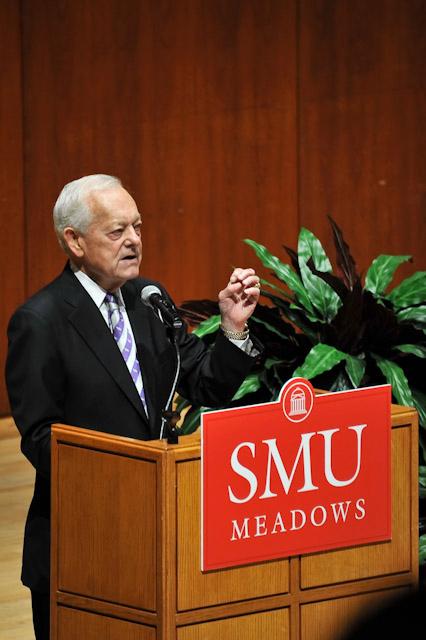
CBS news anchor, Bob Schieffer, delivered the Rosine Smith Sammons lecure in Media Ethics presented by the Division of Journalism at SMU’s Meadows school of the Arts Tuesday. (Sidney Hollingsworth/The Daily Campus)
Bob Schieffer spoke about the impact social media and the Internet has had on journalism in Caruth Auditorium at the 12th annual Rosine Smith Sammons Lecture Series in Media Ethics.
With an audience filled with SMU and TCU community members, students and faculty, Bob Schieffer knew exactly how to break the ice.
“I heard there was a football game this weekend,” Schieffer, a
TCU alum, joked to a sold-out crowd Tuesday evening.
Schieffer, a veteran CBS newsman and moderator of “Face of the Nation,” spoke about the ever-changing mediums of journalism and the obligation journalists have to tell the truth.
The Sammons Lecture Series is funded by a generous endowment from the Rosine Foundation Fund of Communities Foundation of Texas and provides permanent resources for the Meadows School of the Arts to present annual lectures focusing on media ethics.
“We are in the midst of a communication revolution and it’s moving at a warp speed,” Schieffer said.
When Schieffer first began his career working for the Fort Worth Star Telegram, newspapers were the dominant media.
However, everything changed the moment Kennedy was shot.
“That weekend was a learning experience,” Schieffer said. “It was the first time we as a country saw news being gathered.”
Dan Spigel, an audience member from Dallas, grew up in Fort Worth and remembers watching Schieffer on little black and white television sets from hardware store windows.
The new technology that has emerged, such as twitter, has increased pressure on journalists to get information quicker than the next person, which has caused problems for the ethical journalist.
It is the journalist’s main duty to knock down false reports that appear on the Internet.
“Everyone who has a computer has the ability to publish news whether it is true, false, or a blatant lie,” Schieffer said, adding that the Internet is the first vehicle we have had to deliver news that has no editor.
After 9/11, Schieffer said journalists began to understand the importance of trumping false reports in order to prevent pandemonium.
Schieffer said the heart of journalism is based on two things: reporters who have courage and training to go to the news when it is happening and to tell it to the best of their ability and editors who are willing to question every fact and work with the reporter to come up with the most true and accurate version of what happened.
“He reminded me of what the media was like when I was growing up,” audience member Tammy Neubauer said. “His energy and objectivity was entertaining and informative.” Schieffer believes the future of this country relies of journalism, and without it democracy would not exist.
“The role of the reporter is to find the truth to the best of their ability, and there is no better way than to get as close as you can to the story and to tell it in the language of your audience,” he said.
The 74-year-old newsman gave hope to the aspiring journalists in the audience and provided advice to those entering the work force.
“Whatever you do and how you choose to live your life, make sure you choose something you like to do and something you think is fun,” Schieffer said. “If you love your job and love what you do, the success part will take care of itself.”








